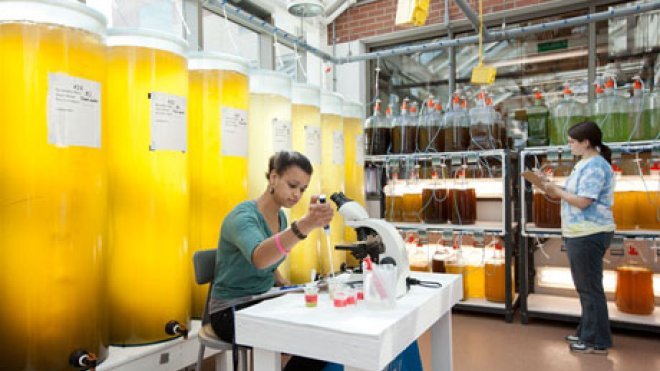Reviving Bay Life
With support via the R.I. Science and Technology Advisory Council, MNS faculty members partner on projects to improve state's marine ecosystem

BRISTOL, R.I. – With the goal of improving the local winter flounder population, identifying invasive marine plants and animals expanding into local waters and determining the cause of a local sea star wasting disease, Roger Williams University marine scientists will lend their expertise to projects aimed at helping marine life recover in local waters.
Roger Williams University faculty members Roxanna Smolowitz, David Taylor and Brian Wysor are key partners with researchers from the University of Rhode Island and Brown University on three of the six projects receiving a 2013 Rhode Island Research Alliance Collaborative Research Grant award, the Rhode Island Science and Technology Advisory Council (STAC) announced Thursday. A total of $810,541 was awarded among 18 scientists and five research institutions across the Ocean State in the seventh round of these awards aimed at facilitating collaborative research in Rhode Island and positioning the state as a leader in understanding and predicting the response of marine organisms and marine ecosystems to climate variability.
The strong RWU presence in the grant funded projects is a key indicator of the innovative work underway at the University, according to Provost Andrew Workman, who accompanied some of the marine biology faculty members at STAC’s announcement of the grant recipients.
“The fact that 50 percent of the state grants have participation from Roger Williams shows the high level of research our marine sciences faculty are undertaking, and it shows that the state values the work we do at Roger Williams,” Workman said.
The 2013 award recipients include projects researching aquaculture diseases, ocean acidification, fisheries management and electro-microbiology, led by multi-institutional teams of scientists from RWU, the University of Rhode Island, Brown University, Rhode Island College and the U.S. Environmental Protection Agency.
Governor Lincoln D. Chafee noted that the STAC’s $8.5 million investment in collaborative research projects to date has yielded a return of $36 million to the state in the form of grants for continued research, new federal programs, infrastructure improvements, commercialization of new products and venture funding for new companies.
“One of Rhode Island’s greatest assets is our magnificent coastline and ocean access,” Gov. Chafee said. “Another is the great minds who, collaboratively, produce world-class ideas and research at our colleges and universities. These STAC grants, which will help maintain and protect our waters and marine life, represent the intersection of these two assets. I look forward to the next level of research and innovation that these grants will make possible.”
The 2013 R.I. Research Alliance Collaborative Research Grant-funded projects are:
Rhode Island Seaweed Biodiversity Project
Christopher Lane, URI; and Brian Wysor, RWU
This team is using genomics to identify and catalogue invasive species of algal marine bio-invaders to improve coastal management and biosecurity in Narragansett Bay.
Grant award: $142,111
Temperature-Mediated Changes in Rhode Island’s Benthic (Bottom-Dwelling Life) Community
David Taylor, RWU; and Jeremy Collie, URI
This team will work to return winter flounder to R.I. waters through better understanding the evolving population dynamics of the blue crab and summer flounder, two of its natural predators.
Grant award: $121,914
The Pathogenic Cause and Impact of the Local Sea Star Wasting Disease
Gary Wessel, Brown University; Roxanna Smolowitz, RWU; Marta Gomez-Chiarri, URI; Edward Baker, URI; and Niels-Viggo Hobbs, URI
This collaboration will bring together six researchers with ecological, veterinary, molecular, microbial and aquaculture expertise to determine the mysterious cause of a deadly infectious disease attacking starfish from New Jersey to the Gulf of Maine.
Grant award: $40,000
Estimating the Potential for Evolutionary Adaption of Marine Organisms to Climate Change
Jason Kolbe, URI; Carol Thornber, URI; and Jason Grear, U.S. EPA
This team will use native shrimp to study the evolutionary potential of marine species to adapt to warming waters.
Grant award: $107,162
Electric Microbial Bacteria in Narragansett Bay Sediments
Jeremy Rich, Brown University; and Bethany Jenkins, URI
Working in the new area of electro-microbiology, this team will pursue their hypothesis that microbial bacteria are evolving to detoxify sediment in coastal dead zones.
Grant award: $199,974
Ocean Acidification Effects on Plankton Community Composition and Food Web Energy Flow
Susanne Menden-Deuer, URI; Tatiana Rynearson, URI; Breea Govenar, RIC; and Jason Grear, U.S. EPA
This team will look at how whole marine communities respond to ocean acidification.
Grant award: $199,380